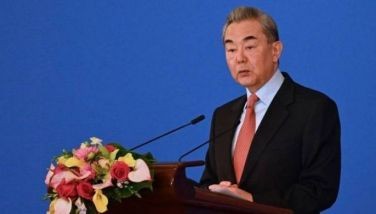Egypt presents proposal to end war in Gaza
CAIRO — Egypt presented a proposed cease-fire to Israel and Hamas aimed at ending the monthlong war, Palestinian officials said early Wednesday after negotiators huddled for a second day of Egyptian-mediated talks meant to resolve the crisis and bring relief to the embattled Gaza Strip.
Palestinian officials told The Associated Press early Wednesday morning that Egypt's proposal calls for easing parts of the Israeli blockade of Gaza, bringing some relief to the territory. But it leaves the key areas of disagreement, including the Islamic militant group Hamas' demand for a full lifting of the blockade and Israeli calls for Hamas to disarm, to later negotiations.
If the sides accept the proposal it would have a significant impact on Palestinians in Gaza as it would improve the movement of individuals and merchandise to the West Bank, the officials said. Gaza exports and other businesses have been hit hard by restrictions imposed on the territory by Israel and Egypt after Hamas took control of Gaza in 2007.
One of the Palestinian officials who spoke to AP said that according to the Egyptian proposal the blockade would be gradually eased.
He said it would stipulate that Israel would end airstrikes on militants, and a 500-meter (547-yard) buffer zone next to the Gaza and Israel frontier would be reduced over time, he said.
The Israeli and Palestinian negotiating teams retired after 10 hours of discussions and will resume the talks later Wednesday, about 12 hours before the current cease-fire is set to expire at midnight, the officials said.
It was not immediately clear if either side would accept the deal.
The Palestinian officials spoke to AP on condition of anonymity because they are not authorized to discuss the negotiations with the media.
The negotiations took place after a three-day truce brokered by Egypt took effect Monday. A similar truce collapsed last Friday after Gaza militants quickly resumed rocket fire with its expiration.
The monthlong Gaza war has killed more than 1,900 Palestinians, the majority of them civilians, Palestinian and U.N. officials say. In Israel, 67 people have been killed, all but three of them soldiers.
Hamas is demanding an end to an Israel-Egyptian blockade that has ravaged Gaza's economy. Israel says the blockade is needed to keep Hamas, which fired thousands of rockets into Israel during the war, from smuggling weapons. Israel is seeking guarantees that it disarm.
With the truce set to expire, Egypt pressed the sides hard to reach a deal.
"The talks are difficult but serious," Moussa Abu Marzouk, head of the Hamas delegation, wrote on his Facebook page. "The delegation needs to achieve the hopes of the people."
Hamas, shunned by the international community as a terrorist organization, seized control of Gaza from internationally backed Palestinian President Mahmoud Abbas in 2007.
Any deal will almost certainly include an increased role by Abbas. The Palestinian leader recently formed a unity government backed by Hamas, ostensibly putting him in charge of Gaza. But in reality, Hamas, with its thousands of fighters and arsenal of rockets, remains the real power.
Another member of the Palestinian delegation reported some progress, saying Israel had offered a number of gestures aimed at improving life for Gaza's 1.8 million residents. They included an increase in the number of trucks permitted to deliver goods into the territory from Israel each day, and the transfer of funds by Abbas' Palestinian Authority to Hamas-affiliated government employees in Gaza. The cash-strapped Hamas has been unable to pay the salaries of its employees for months.
Also included in the purported Israeli package, the official said, was an eventual quadrupling — to 12 miles (19 kilometers) — of the sea area in which Gaza fishing vessels are permitted to operate.
But the official said Israel was linking progress on the Palestinians' biggest demands — to reopen the territory's sea and airport — to Hamas disarming. The group has rejected this demand. He spoke on condition of anonymity because he was discussing ongoing negotiations. Palestinian officials said they were open to extending the talks if progress was being made.
Israeli officials declined comment on the negotiations. But in a possible sign of progress, the Ynet website said Israeli Prime Minister Benjamin Netanyahu had been speaking to senior Cabinet ministers about an emerging agreement.
It said the deal would include a softening of the blockade to allow the entry of construction materials for rebuilding Gaza under strict international supervision. Israel has limited the flow of goods like concrete and metal, saying Hamas would use them for military use.
Defense Minister Moshe Yaalon said he did not know if there would be a deal by Wednesday night's deadline, and warned that fighting could resume.
"I don't know if we should extend negotiations. It could be that fire erupts again," he said. "We must be on alert and ready all the time."
The U.N. Human Rights Council in Geneva this week formed a commission to look into possible war crimes violations during the Gaza fighting.
Israel has not said whether it will cooperate with the investigation. But the Foreign Ministry said Tuesday that it believes the commission, and its chief investigator, Canadian law professor William Schabas, are biased against Israel.
In a television interview, Schabas said he wouldn't let his history of criticizing Israeli leaders affect his ability to carry out the investigation.
"What someone who sits in a commission or who is a judge has to be able to do is put these things behind them and start fresh and this is what I intend to do," he told Israel's Channel 2 TV.
He would not say whether he would investigate Hamas' actions.
Israel's Foreign Ministry called the commission a "kangaroo court" whose verdict is "known ahead of time."
Meanwhile, the world's largest bloc of Islamic nations called for an international donors conference for Gaza. The 56-member Organization of Islamic Cooperation also expressed its disappointment at the failure of the U.N. Security Council "to assume its responsibilities" of maintaining peace and security.
Saudi Arabia's Foreign Minister Saud Al-Faisal said his country would work with other donors to finance $500 million for the reconstruction of houses and facilities in Gaza. He did not elaborate. Officials have said at least $6 billion is needed.
___
Associated Press writers Ian Deitch in Jerusalem and Aya Batrawy in Dubai, United Arab Emirates, contributed to this report.
- Latest
- Trending





























